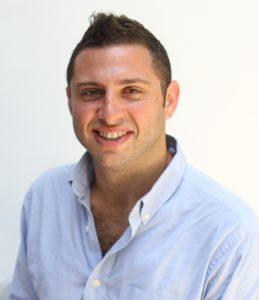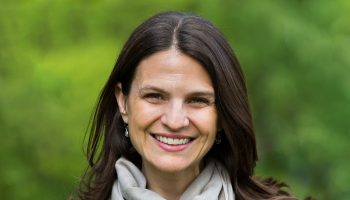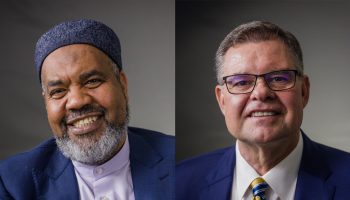
When Rabbi Nate DeGroot attended the Center for Earth Ethics conference several years ago, the founder Karenna Gore gave a presentation describing the center’s origins, and the bringing together of 12 faith leaders to envision what the center could be. At the end of the day, DeGroot remembers Gore sharing, all of the faith leaders came to the same conclusion.
“(That conclusion) was that our understanding, our understanding of ourselves as separate from nature, is an illusion,” DeGroot said. “It’s a fallacy that we are separate from each other, and separate from the natural world. … We share a common root that what we do to the earth, we do to ourselves.”
Bridging this separation is part of DeGroot’s work at Hazon Detroit, where he is associate director and the spiritual and program director. Described as the Jewish lab for sustainability, Hazon — the Hebrew word for “vision” — is dedicated to creating a healthier and more sustainable Jewish community, and for the world.
“We’re putting forth a vision of a different kind of world,” DeGroot said. “The world doesn’t have to be like it is right now. … We recognize we’re in the midst of a global environmental crisis, and Judaism compels us to respond.”
DeGroot will launch Week One’s Interfaith Lecture Series — dedicated to the theme of “Faith the Save the Earth” — with his presentation, “Tikkun Adam(ah): A Jewish Response to a World in Upheaval,” which goes live at 2 p.m. EDT Tuesday, June 30, on the CHQ Assembly Video Platform.
Work at Hazon focuses on three “buckets,” DeGroot said: supporting, empowering and uplifting the food and environmental justice movement led by Detroit’s Black and Native communities; helping the Jewish community in the suburbs to reconnect with their earth-based Jewish roots; and reconnecting those two demographics in a way “that is accountable to our various histories,” DeGroot said.
Judaism, he said, is “foundationally grounded in the earth — our traditions, our holidays, the way we tell time — is borne of a deep relationship with the earth.” The “clarion call” of Shema Yisrael — the prayer at the center of morning and evening prayer services — is “an all-encompassing Oneness that there is nothing other than God.”
“On this deep, fundamental level, Judaism begins as its starting point that we are not separate from nature; we are all connected as one,” DeGroot said. “That lays the foundation for environmental sustainability work. Instead of the earth being objective, separate, something we have dominion over that we can use or extract for human purpose, human projects and human gain, it’s integrated into a holistic system. How we treat the earth is how we treat the divine. The natural world is a manifestation of how we treat the divine, and how we treat each other.”
But in Contemporary Judaism, those roots — of a faith tradition deeply grounded in the earth — have been undernourished, and DeGroot traces that schism to the destruction of the Second Temple in Jerusalem. Judaism was temple-based, DeGroot said, with the faithful gathering crops and animals to bring to the Temple as offerings, and very geographically based, with seasonal holidays dedicated to seasonal needs — like praying for rain.
“At that point, we were an Earth-based religion, … but when the diaspora began, there was a major shift,” he said. “… Instead of Temple being our center, the Torah and our stories and our recitations became the central driving forces of Judaism.”
Essentially, Rabbinic Judaism took the place of Temple Judaism, and “we’re still in that Rabbinic paradigm. Because we weren’t on the same land of our rituals and traditions, we lost touch with it,” DeGroot said. The evolution of traditions is a story of migration and assimilation, of marginalization and adaptation — and the work of reclaiming those traditions being done at Hazon goes hand-in-hand with the work the organization does with the Black- and Native-led food and environmental justice work in Detroit.
“It’s important to situate any conversation about climate within the larger conversation we’re reckoning with as a country — COVID and social uprisings, our systems and histories — in the context of white supremacy and extractive capitalism,” DeGroot said. “The point that Judaism leads us to, is that this isn’t just how we treat the earth. The way we treat the earth is a symptom of a much larger structure — the same system at play that allows COVID to impact people of color, (the system) that’s killing Black lives. It’s impossible and irresponsible to engage in conversation about climate without talking about the roots of these problems that prioritize and reward systems and companies and individuals who denigrate the earth and other people.”
All of these systems are related, DeGroot said, and in his lecture he wants to offer up what Martin Luther King, Jr. called “a revolution of values.”
“If we want the earth to be in full and abundant health, we need to transform ourselves as individuals and as a society … and undertake a major reckoning of the foundations this country was built on, and be ready and willing to replace those and transform those,” DeGroot said. “I want to offer that. … I really pray that we can transform those systems, because we have very grim reports of what will happen, and we know who it’ll happen to. I do see in my own line of work that (climate activism) is a very white-led conversation. This is much bigger than that, and the people impacted (by climate change) should be leading that conversation. The rest of us should follow.”
This program is made possible by the Gertrude Elser Schroeder Fund.




